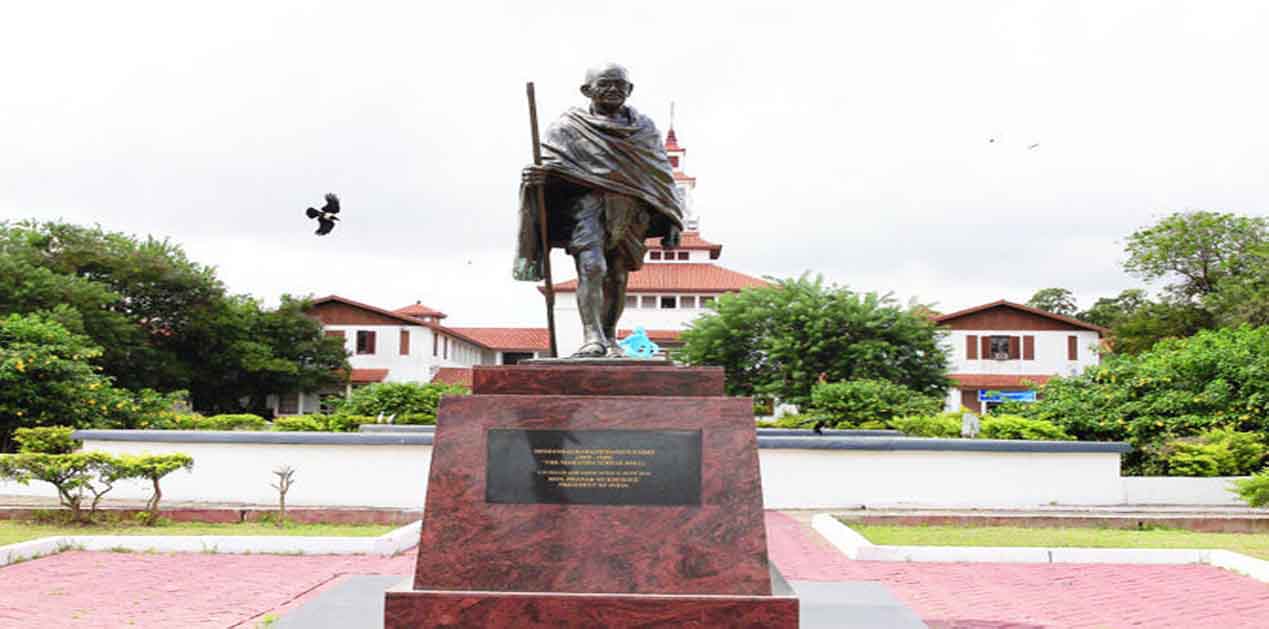With the gaining of Independence from the Britishers in 1957, the Gold Coast of Africa came to be known as Ghana with Accra as its capital. The country lies in the western part of Africa, in the Gulf of Guinea; bordered by Togo, Ivory Coast, Burkina Faso. India and Ghana have shared a warm and cordial relation, as the foundation of their association was laid by Jawaharlal Nehru and Kwame Nkrumah.
Recently, a statue of Mahatma Gandhi was pulled down in Africa from an esteemed University of Ghana entitling him a ‘Racist’. In 1893, Gandhi had first travelled to Africa, when he was offered a job to serve as a legal counsel to a merchant in South Africa. During his stay, Gandhi promulgated the doctrine of Satyagraha and in a very short time, Gandhi turned out to be a great leader in the eyes of the Indian community of South Africa. Despite being born in India, Gandhi always said that ‘he was born in India, but was made in South Africa’. He fought against the oppressive treatment of whites against the native Africans and Indians, and later on in 1894 formed the Natal Indian Congress. By 1986 Gandhi’s ideology was widely accepted by the oppressed class which made him a political leader in South Africa. Nelson Mandela influenced by Gandhi, credited the victory of South Africa’s truth and reuniting commission to the impact of Gandhi’s idea (Nitin Mehta, The Guardian 2016). Mahatma Gandhi, as a pathfinder of anti-colonial struggle was also admired by many other black Africans. He was successful in inspiring other African nationalists like Nkrumah, Julius Nyrere, Jomo Kenyatta, Tom Mboya and Kenneth Kaunda. Nkrumah owed his success and formation to Gandhi and turned into a disciple of his nonviolent strategy of “Satyagraha”. He termed Gandhi’s strategy of non-violence as “Positive Action” (Biney, 2008). On the other hand, Nyrere also advocated Gandhi's strategy to attain independence through non-violent protests in Tanzania.
According to Mandela, Gandhi is an integral part of South Africa’s history and his contribution from liberating people from apartheid and bringing peaceful transition in the country cannot be ignored. In a letter Mandela wrote, “… in 21 years of his stay in South Africa we were to witness the birth of ideas and methods of struggle that have exerted an incalculable influence on the history of the peoples of India and South Africa.” (E.S. Reddy, The Wire 2016). Mandela has further said, “Gandhi’s political technique and elements of the nonviolent philosophy developed during his stay in Johannesburg became the enduring legacy for the continuing struggle against racial discrimination in South Africa.” (E.S. Reddy, The Wire 2016). He despite knowing the racist statement made by Gandhi said that, “Gandhi must be forgiven those prejudices and judged in the context of the time and circumstances. We are looking here at the young Gandhi, still to become Mahatma, when he was without any human prejudice save that in favour of truth and justice” (The Wire, 2016). In many of his speeches, Mandela has also referred to Gandhi as the hero of both India and South Africa. It was not only Mandela but also, other African leaders who accepted that it was Gandhi from where they derived inspiration and the racial statement of his never distracted or disturbed anyone in the country. He was accepted as a leader of peace and non-violence (The Wire, 2016). Gandhi was thus appreciated for fighting against discrimination for twenty years in the country and finally decided to return to India in 1914.
In 2016, former President Pranab Mukherjee gifted the Government of Ghana a statue of Gandhi as a symbol of strong ties between the two countries. The statue was immediately placed in the University of Ghana, Accra. Soon after its installation, there was a group of students and faculty who started protesting against it. Gandhi, famously known for non-violence around the world, was criticized for making the statement that Indians are racially superior to the black Africans (Lily Kuo, Quartz Africa). While residing in South Africa, it was said that Gandhi again and again publicly referred black Africans as “savages” and “kaffirs”, a racial slur, claiming that the Indians were essentially better people brought down by mere association” (Tekendra Parmar, 2016). Looking at the agitation of the people in Ghana, the Government decided to reallocate the statue of Gandhi in order to stop the controversy, and also to stop anyone from deliberately damaging it. However, owing to a delay in deciding where the statue would be placed, the matter was raised in a petition. In September 2018, a group of teachers raised the first petition wherein they mentioned that the University of Ghana should ‘first and foremost’ place the statue of African heroes and not that of a person accused of racism. It wasn’t the first time that Gandhi’s preconceived notion towards other races was put to question - recently, his statue in Johannesburg was splashed with white paint during a protest against its installation.
Implications for India
With the removal of the statue, some Ghanians proclaimed it as a sign of victory for all the Ghanaians and the statue had nothing to do with diplomatic ties between the two nations. Although, the administration of the University refused to comment, however an official at Ghana's Ministry of Foreign Affairs mentioned that the decision was made internally by the University (Aljazera, 2018). It was said that it was wrong to install the statue even after knowing that the African thinkers and scholars were angry with Gandhi. Such a response got more attention as the Indian Government has kept Africa on priority, and there is a growing atmosphere of India's goodwill in Africa. Since the days of decolonisation, Ghana has remained one of India's oldest partner in Africa. It is also among the top investment destinations for Indians in the African continent.
In response to the pulling down of the Gandhi statue, the Indian Government has cancelled the scholarship scheme which was provided to 2,000 students of Ghana in India under the Mahatma Gandhi Scholarship Scheme. The scholarship provided students with full financial support throughout a University education in India and partner universities across the globe. But, lately a statement has been issued by the Mahatma Gandhi Scholarship Secretariat, where it mentioned that the students of Ghana cannot continue to enjoy the benefits of the scheme which seeks to honour someone whom they describe as racist (Baffour Gyawu , 2018).
It is not an exaggeration to state that Gandhi was a great leader and his efforts to unite people of all classes and oppose racism in Africa cannot be ignored. In light of this, we need to deepen our engagement with Ghana by keeping a much comprehensive and productive outlook in order to take the relationship to new heights.
References:
- Aljazeera, 2018: ‘Statue of 'racist' Gandhi removed from Ghana university campus.’
https://www.aljazeera.com/news/2018/12/statue-racist-gandhi-removed-ghana-university-campus-181214155413971.html - Baffour Gyawu , 2018: ‘India cancels scholarships of 2,000 Ghanaian students over removal of Gandhi’s statue’. http://news7pm.com/india-cancels-scholarships/
A. BINEY “The Legacy of Kwame Nkrumah in Retrospect”, in The Journal of Pan African Studies, vol.2, no.3, March 2008, p. 131. - E.S. Reddy 2016: Some of Gandhi's Early Views on Africans Were Racist. But That Was Before He Became Mahatma, ‘The Wire’. https://thewire.in/history/gandhi-and-africans
- Gail M. Gerhart, Teresa Barnes, Antony Bugg-Levine, Thomas Karis, Nimrod Mkele .From Protest to Challenge 4-Political Profiles (1882-1990).
- Lily Kuo 2016, ‘Ghana is taking down a statue of Gandhi from its oldest university’, Quartz Africa.
https://qz.com/africa/802221/ghana-is-removing-a-statue-of-gandhi-from-its-oldest-university-after-protests-over-past-racist-remarks/ - Nitin Mehta 2016, ‘Gandhi was an inspiration across Africa’, The Guardian.
https://www.theguardian.com/world/2016/oct/13/gandhi-was-an-inspiration-across-africa - Tekendra Parmar, 2016: ‘Protesters at the University of Ghana Want a 'Racist' Gandhi Statue Removed’, Time Magazine.
http://time.com/4505357/university-ghana-racist-gandhi-statue/
http://www.jacana.co.za/component/virtuemart/?keyword=from+protest+to+ch
Image Source: http://www.arabnews.com/sites/default/files/styles/n_670_395/public/07/10/2016//1475764897996306700.jpg?itok=H968pjHk











Post new comment